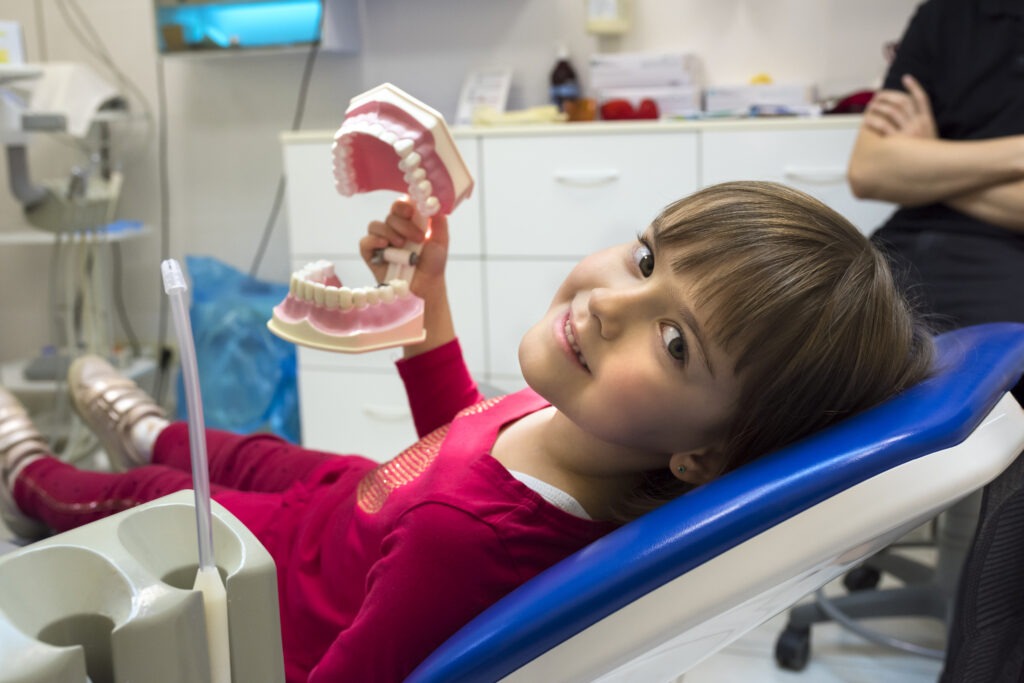Imagine this: your little munchkin, thumb or pacifier snugly in place, drifting off to dreamland or quietly exploring their mini-universe. It’s a sight that melts every mom’s heart. But as the calendar pages flip, you might wonder: “Is this cute habit secretly plotting against my kiddo’s smile?”
At Manzella Orthodontics, we want you to have everything you need to know about pacifiers and thumb-sucking. We’ll uncover the good, the bad, and the not-so-pretty sides of these habits and dish out practical advice for West Seneca parents. So, if you’ve ever found yourself mulling over your child’s thumb-sucking or pacifier use, Dr. Manzella has your golden ticket.
Baby 101: The Basics
From the moment they pop into the world, babies have an instinct to suck. This reflex is their secret weapon for survival, as it aids in feeding. Beyond filling their tiny tummies, sucking doubles as a comfort blanket and a relaxation guru. That’s why many infants develop habits like thumb-sucking or using a pacifier.
Thumb sucking and pacifier use are as normal as diaper changes and lullabies in infants and young children. In fact, these habits can be a lifesaver in the early stages of life. They can help soothe a fussy baby, provide a sense of security, and even aid in sleep. For many children, these habits are routine as watching cartoons and a way to navigate their world.
However, as children grow and their teeth begin to sprout, prolonged thumb sucking or pacifier use can throw a wrench in their oral health. While these habits are harmless in infants and toddlers, continuing them beyond the age of three can potentially lead to dental detours. The pressure exerted by the thumb or pacifier can interfere with the average growth and development of the mouth, including the alignment of the teeth and the shape of the roof of the mouth.
Pacifiers, Thumbs, and Smiles: The Impact
While pacifiers and thumb sucking can be a comfort blanket for infants and toddlers, prolonged use of these habits can significantly affect a child’s dental health. The constant pressure exerted by the thumb or pacifier on the gums, teeth, and roof of the mouth can lead to various orthodontic oopsies.
One of the most common issues is the misalignment of teeth, often called “pacifier teeth” or “thumb-sucking teeth.” This typically presents as an open bite, where the front teeth don’t meet when the mouth is closed, or an overbite, where the upper chompers stick out further than the bottom ones. These misalignments occur because the pressure from the thumb or pacifier prevents the front teeth from developing correctly.
Prolonged thumb sucking or pacifier use can also affect the jaw’s alignment. The constant pressure can cause the jaw to shift, leading to problems with your child’s bite. This can result in difficulties with chewing and speaking and, in severe cases, may require orthodontic treatment.
It’s important to note that not all children who use pacifiers or suck their thumbs will develop these issues. The risk largely depends on the intensity and duration of the habit. A child who passively rests their thumb in their mouth is less likely to have dental problems than a child who vigorously sucks their thumb. Similarly, a child who uses a pacifier or sucks their thumb beyond the age of three is at a higher risk of developing orthodontic issues.
While these habits can lead to dental problems, it’s crucial to remember that they are a normal part of early childhood and often stop on their own. However, if your child continues these habits beyond three, it may be time to start thinking about ways to help them quit. In the next section, we’ll discuss when moms should be concerned and provide some tips for helping your little one break these habits.
Mom To The Rescue: How You Can Help
As a mom, it’s natural to be concerned if your child continues to suck their thumb or use a pacifier beyond their toddler years. While these habits often stop on their own, some children may need extra mom power. Here are some signs to watch for and tips on how you can assist your little one in breaking these habits.
First, be aware of the age at which these habits typically stop. Most children naturally give up thumb sucking and pacifier use between the ages of two and four. Suppose your child continues these habits beyond this age, especially once permanent teeth emerge. In that case, it may be time to intervene.
Look for signs of dental detours. If you notice changes in your child’s teeth alignment or the shape of their mouth, or if they’re having trouble with speech or eating, it’s advisable to consult with Dr. Manzellal.
Now, let’s discuss some mom-approved strategies to help your child break these habits:
Shower your child with praise when they don’t suck their thumb or use a pacifier. Consider creating a reward system to motivate them.
If you notice your child sucking their thumb or using a pacifier, try to distract them with a game or activity. Often, children resort to these habits when they’re bored or idle.
Many children use these habits for comfort. Offer a cuddle or words of reassurance if they feel anxious or upset.
If your child is old enough, involve them. Explain why it’s important to stop and ask for their ideas on how to break the habit.
Remember, patience is critical. It can take time for a child to break these habits, but they can successfully overcome them with your support and understanding.
Your Smile Heroes at Manzella Orthodontics
We understand moms’ concerns about thumb-sucking and pacifier use at Manzella Orthodontics in West Seneca and the surrounding areas. Our team, led by Dr. Manzella, is here to provide guidance and support. If you’re worried about the impact of these habits on your child’s dental health, we’re ready to help. We offer a range of orthodontic solutions tailored to your child’s needs, ensuring they grow into a healthy, confident smile. Schedule a free consultation with us today. Let’s work together to ensure your child’s smile remains as bright and beautiful as their future.
 716-675-0155
716-675-0155


